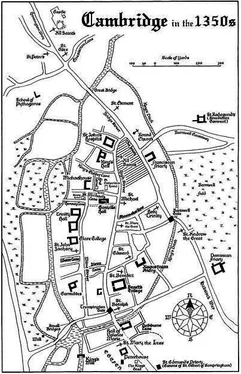But then the solos ended, and it was time for the chorus. It began with the basses, a grumbling mass of indistinguishable words, which comprised several notes produced simultaneously, although Bartholomew was fairly certain there was only supposed to be one. The tenors joined in, although they stopped after a few moments when frantic signalling from Michael indicated they were early. Conversely, the children did not start singing at all, and he was obliged to sing their part himself until they realised they had missed their cue. To make up for their tardiness, they sang more quickly, and had soon outstripped the basses and were surging ahead.
The piece moved into a crescendo when the voices suddenly and unexpectedly came together, and the singers felt they were on familiar ground. Michael waved his arms furiously in an attempt to make them sing more softly, but the choir were having none of that. They knew their words and their notes, and they were determined that everyone should hear them. The sound was deafening, and the friars celebrating the mass grew distracted and flustered. Kenyngham poured wine into the wrong vessel, and Suttone knocked a paten off the altar, sending it clattering across the flagstones – except, of course, that the choir drowned any sound it might have made.
Langelee swung a censor rather more vigorously than was necessary, directing clouds of throat-searing incense in the choir’s direction in an attempt to silence at least some of them. It did not work, although Bartholomew noticed that the scholars from Ovyng, who were standing uncomfortably close to the choir and were in the line of Langelee’s fire, were tugging at hoods and coughing. Father Ailred’s face was almost purple as he struggled not to choke, while Godric had the folds of his cowl pressed to his face.
But it was over at last – and rather abruptly, as though the singers had suddenly run out of energy – and the church was flooded with a blessed silence. There were sighs of relief all around, and the mass continued. Bartholomew saw tears running down Ailred’s face, but suspected that these were caused by incense-induced coughing, rather than emotion. Godric gazed up at the rafters with his mouth open, although whether he was inspecting the greenery or was dazed from the singing, Bartholomew could not tell. Meanwhile, their students, neatly tonsured and clean for the occasion, stood in a line. All appeared to be healthy and well rested, and it did not seem as if any harboured a guilty conscience over the violent death of Norbert.
When Kenyngham and Suttone had completed the mass, the scholars formed their processions again and made their way back to their colleges and hostels. Michaelhouse went first, followed by Physwick, Ovyng, Garrett and St Catherine’s hostels. It was an impressive sight, with black-, blue- and red-robed scholars walking through the falling snow, led by acolytes and crucifers.
The choir had been promised food and a penny for their labours, and Langelee was gracious as he handed out coins, congratulating various members on their performances. Many of the town children were there, too, since it was a tradition that Michaelhouse provided them with bread on Christmas morning. Bartholomew leaned against the servants’ screen at the back of the hall and watched with satisfaction the sight of the needy eating their fill at the College’s expense.
Once the choir had dined and been sent on their way with Langelee’s diplomatic praise still ringing in their ears, the scholars attended the Mass of the Divine Word, which was the longest of the three Christmas Day offices, and the most peaceful. When it was over, and the scholars were once again marching through the snow, Langelee broke ranks and dropped back to walk with Bartholomew.
‘I keep forgetting something I must tell you.’
‘What?’ asked Bartholomew, not liking the tone of the Master’s voice. He was sure whatever Langelee had to say was not something he would want to hear.
‘The feast this afternoon,’ said Langelee. ‘You know it is our custom to invite guests from the parish to help us celebrate?’
‘You have invited my sister and her husband,’ said Bartholomew. ‘You hope they will donate some of their money to the College.’
‘Obviously,’ said Langelee. ‘Oswald Stanmore is a rich man, and it does no harm to remind him that Michaelhouse has deep but empty coffers. But I was not thinking about him.’
‘Sheriff Morice,’ suggested Bartholomew. ‘You told us a week ago that he was coming. None of us relish the prospect of his company, but we have all agreed to behave and not tell him that he is a corrupt manipulator who took office only to further his own ambition.’
‘Ambition is why most men become sheriffs,’ said Langelee, puzzled that Bartholomew should imagine otherwise. ‘But I am not referring to Morice, either. I have invited Walter Turke. He is a wealthy merchant, and I thought I might persuade him to become a Michaelhouse benefactor. I can assure you I had no idea you were once betrothed to the woman who is now his wife. All that happened a long time before I came here.’
‘I see,’ said Bartholomew, his thoughts whirling. He wondered whether he might still be able to hire a horse, so that he could ride away into the snow and avoid what would doubtless be a wretchedly awkward experience. A noisy public feast was certainly not the venue he had envisaged for his impending reunion with Philippa.
‘I am sorry,’ said Langelee, sounding genuinely contrite. ‘I would not have invited him had I known your predicament. When Stanmore told me he had a rich fishmonger staying with him, it just seemed natural to invite him to our feast.’
‘Philippa married a fishmonger?’ asked Bartholomew, startled.
‘I thought you knew,’ said Langelee, embarrassed.
‘I knew Turke was a merchant, but I assumed he was something more …’ Bartholomew cast around for the right word ‘… more distinguished than a peddler of fish.’
‘Distinguished be damned! The Fraternity of Fishmongers is a powerful force in London, and Turke is its Prime Warden. But just because he made his fortune in fish does not mean to say that he deals with it directly. He will have apprentices for beheading and gutting, and that sort of thing.’
‘I suppose so,’ said Bartholomew, knowing that merchants at the top of their professions concentrated on the commerical, rather than the more menial, aspects of their work. It was likely Turke had not touched a scaly body in years, and the image of Philippa living in a house that reeked of haddock and sprats, which had sprung unbidden into his mind, was almost certainly wrong.
‘Never mind Turke,’ said Michael, entering into their conversation. ‘What about Philippa? She is the one Matt is itching to see. Did you invite her?’
‘I hardly think that–’ began Bartholomew indignantly.
‘She accepted the invitation,’ interrupted Langelee. ‘I have not met her yet, and it will be interesting to see the woman who captured Bartholomew’s heart.’ He clapped a sympathetic hand on the physician’s shoulder. ‘But I appreciate this might be difficult for you – unrequited love and all that. If you would rather absent yourself, then I shall grant you dispensation to do so. It is only fair, since it is my fault that you are faced with this awkward situation.’
‘I would like to absent myself,’ said Suttone in a gloomy voice behind them. ‘I do not want to spend all day watching the antics of acrobats.’ The last word was spoken with such distaste that Michael started to laugh. It was as though the Carmelite regarded entertainers in the same light as the town’s Frail Sisters.
‘All Fellows are obliged to attend College feasts, and malingering is not permitted,’ reprimanded Langelee sharply. He turned to Bartholomew. ‘But I can tell her you are indisposed – that you ate something that set a fire in your bowels, and that you cannot stray far from the latrines.’
Читать дальше












